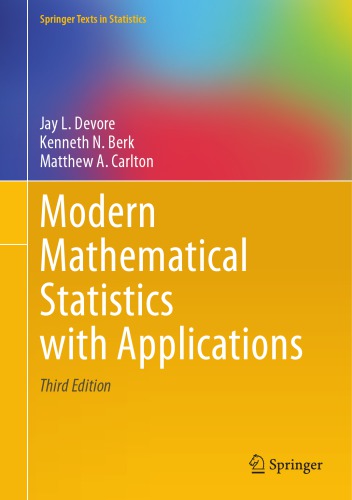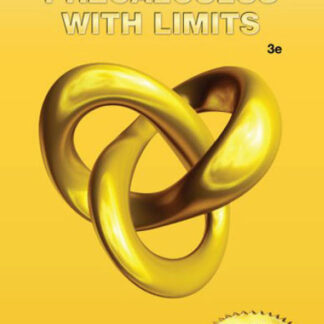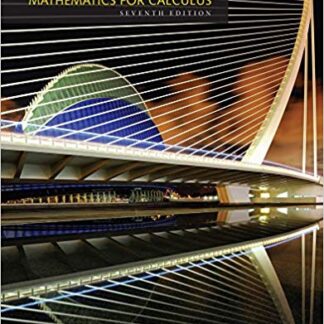Description
Modern Mathematical Statistics with Applications 3rd Edition by Jay L. Devore, ISBN-13: 978-3030551551
[PDF eBook eTextbook]
- Publisher: Springer; 3rd ed. 2021 edition (April 30, 2021)
- Language: English
- 987 pages
- ISBN-10: 3030551555
- ISBN-13: 978-3030551551
This 3rd edition of Modern Mathematical Statistics with Applications tries to strike a balance between mathematical foundations and statistical practice. The book provides a clear and current exposition of statistical concepts and methodology, including many examples and exercises based on real data gleaned from publicly available sources. Here is a small but representative selection of scenarios for our examples and exercises based on information in recent articles:
- Use of the “Big Mac index” by the publication The Economist as a humorous way to compare product costs across nations
- Visualizing how the concentration of lead levels in cartridges varies for each of five brands of e-cigarettes
- Describing the distribution of grip size among surgeons and how it impacts their ability to use a particular brand of surgical stapler
- Estimating the true average odometer reading of used Porsche Boxsters listed for sale on www.cars.com
- Comparing head acceleration after impact when wearing a football helmet with acceleration without a helmet
- Investigating the relationship between body mass index and foot load while running
The main focus of the book is on presenting and illustrating methods of inferential statistics used by investigators in a wide variety of disciplines, from actuarial science all the way to zoology. It begins with a chapter on descriptive statistics that immediately exposes the reader to the analysis of real data. The next six chapters develop the probability material that facilitates the transition from simply describing data to drawing formal conclusions based on inferential methodology. Point estimation, the use of statistical intervals, and hypothesis testing are the topics of the first three inferential chapters. The remainder of the book explores the use of these methods in a variety of more complex settings.
This edition includes many new examples and exercises as well as an introduction to the simulation of events and probability distributions. There are more than 1300 exercises in the book, ranging from very straightforward to reasonably challenging. Many sections have been rewritten with the goal of streamlining and providing a more accessible exposition. Output from the most common statistical software packages is included wherever appropriate (a feature absent from virtually all other mathematical statistics textbooks). The authors hope that their enthusiasm for the theory and applicability of statistics to real world problems will encourage students to pursue more training in the discipline.
Table of Contents:
Cover
Front Matter
1. Overview and Descriptive Statistics
2. Probability
3. Discrete Random Variables and Probability Distributions
4. Continuous Random Variables and Probability Distributions
5. Joint Probability Distributions and Their Applications
6. Statistics and Sampling Distributions
7. Point Estimation
8. Statistical Intervals Based on a Single Sample
9. Tests of Hypotheses Based on a Single Sample
10. Inferences Based on Two Samples
11. The Analysis of Variance
12. Regression and Correlation
13. Chi-Squared Tests
14. Nonparametric Methods
15. Introduction to Bayesian Estimation
Back Matter
Jay L. Devore received a B.S. in Engineering Science from the University of California, Berkeley, and a Ph.D. in Statistics from Stanford University. He previously taught at the University of Florida and Oberlin College, and has had visiting positions at Stanford, Harvard, the University of Washington, New York University, and Columbia. He has been at California Polytechnic State University, San Luis Obispo, since 1977, where he was chair of the Department of Statistics for seven years and recently achieved the exalted status of Professor Emeritus.
Jay has previously authored or coauthored five other books, including Probability and Statistics for Engineering and the Sciences, which won a McGuffey Longevity Award from the Text and Academic Authors Association for demonstrated excellence over time. He is a Fellow of the American Statistical Association, has been an associate editor for both the Journal of the American Statistical Association and The American Statistician, and received the Distinguished Teaching Award from Cal Poly in 1991. His recreational interests include reading, playing tennis, traveling, and cooking and eating good food.
Kenneth N. Berk has a B.S. in Physics from Carnegie Tech (now Carnegie Mellon) and a Ph.D. in Mathematics from the University of Minnesota. He is Professor Emeritus of Mathematics at Illinois State University and a Fellow of the American Statistical Association. He founded the Software Reviews section of The American Statistician and edited it for six years. He served as secretary/treasurer, program chair, and chair of the Statistical Computing Section of the American Statistical Association, and he twice co-chaired the Interface Symposium, the main annual meeting in statistical computing. His published work includes papers on time series, statistical computing, regression analysis, and statistical graphics, as well as the book Data Analysis with Microsoft Excel (with Patrick Carey).
Matthew A. Carlton is Professor of Statistics at California Polytechnic State University, San Luis Obispo, where he joined the faculty in 1999. He received a B.A. in Mathematics from the University of California, Berkeley and a Ph.D. in Mathematics from the University of California, Los Angeles, with an emphasis on pure and applied probability; his thesis research involved applications of the Poisson-Dirichlet random process. Matt has published papers in the Journal of Applied Probability, Human Biology, Journal of Statistics Education, and The American Statistician. He was also the lead content adviser for the “Statistically Speaking” video series, designed for community college statistics courses, and he has published a variety of educational materials for high school statistics teachers. Matt was responsible for developing both the applied probability course and the probability and random processes course at Cal Poly, which in turn inspired him to get involved in writing this text. His professional research focus involves applications of probability to genetics and engineering. Personal interests include travel, good wine, and college sports.
What makes us different?
• Instant Download
• Always Competitive Pricing
• 100% Privacy
• FREE Sample Available
• 24-7 LIVE Customer Support




